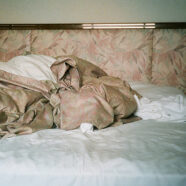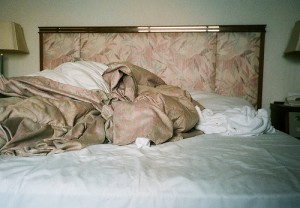Possible to be Weary: NORA
Dear Nora,
It is with no small degree of trepidation that I respond to your query. Not only has it been too long between letters (I’ve not been completely idle…working on the long, literary defense of my love for champagne, cocaine, La Perla lingerie and soccer for you to read at my funeral. Did I leave anything out? I can’t think of a better way to drop the news that I’m completely made up, that I’m nothing. “We cool?”), but written history has all of the helpless tenacity of an insect splayed on a liquid inversion of sky. And if I remember correctly from our last conversation, we were talking about finches, yolks; wondering what we do with all those nuts. You presented a few choices, and here’s what I came up with: I hate Brazil nuts; Gary Busey is too obvious an answer; the lug nut, though unappreciated if not out of fashion (in both expression and thing-ness), I must say, is not a contender. So I’m going to go with what I know and say “Deez Nuts”.
To get a jump on the prosecution: so much has been misunderstood about the boy. My condition prohibits a full-scale induction of the past, and neither do I want one. If it is as you say, and your graduate work aims to save Simon from the speculation of cynics, anarchists and other smart sets of perverts and miscreants, then I will help you, as your patience stands upon the digressions of the up-late type.
The boy was as much of a brother to me as I will ever be permitted to know, and public record has done nothing but disavow the filiation by making me out to be some lovesick chippie, who dips her quill in ink and watches through keyholes. If I loved him in part for his youth, then surely as a boy and a girl in a breakfast nook, steeping tea, giggling about those old Paris prints of our grandparents in their jaunty hats and affected earnestness, but there is more to this than the votive pestilence of an old woman watching her golden plashings by the sea. Let us not have an end to introductions; they are everything and renewable.
As you are probably aware, my porch looks over a park, a modest tract with a few elms and an unceasingly sad menagerie of playground equipment, the latter of which have been ringed around by a hapless pool of sand. In the evenings, the high school kids drape their oversized limbs about these playthings in various postures of loiter and withdrawal. It was here among the muted tones whose meaning dissolved just below the line of leaves that I heard him; his voice registered in its even, even monotone quietism the most plaintive urgency, so that I stopped by the banister and listened to the cadence betray it.
“Maybe this time, Osmond, we will succeed in defying the laws of nature” – I must have moved to the window at this point, because I remember the image of one boy, sloping stride, and the considerably shorter, corrected pigeon-toe of his companion. The small boy assumed his proper place in the seat of the middle swing with tight-lipped gravity. The other got immediately behind him with words of encouragement: “At the apex, remember, in spite of your lunch, that the serpent swam a vertex to the sun. This moment is decisive. Before the links remember the Earth, that moment when their tautness has lost your weight, now, now is the instant which you must look backward. If we are correct, the fourth dimension is beneath our feet when we look through our stomach through our eyes.” Somehow, the smaller fellow, who from appearances looked no more than ninety pounds, was game. “Right. Right,” he affirmed, “But cut that Royal We shit out, ok?”
“Quite right, dear fellow. Just a show of solidarity. Besides, mine is no small task. IF you disappear entirely, who will break the news to your poor mother?”
The smaller boy, Oggie, or Ollie or something, answered him with that adolescent gruffness that masks the inchoate helplessness of young people. “Stay away from her, you son of a bitch.” They both laughed at that, and then Simon gestured over an invisible belly: “Banish not Jack Falstaff, but taketh instead, in lieu of a dowry for thy mother in her chaste vestments of tennis, a whole week’s worth of my cafeteria milk.”
The other giggled in the buckle of the swing: “I do, I will, and forthwith, Slopheap, thoust will reckon me modest henceforth and forthwith again for good measure, as Prince Osmondo.” They carried on this way, as aware of the comic in the tragic as they were ignorant of the tragic in the comic. Forgive an exile this platitude; at least, I meant only to relate and the Furies know well enough how the boys this first meeting came to understand this false distinction.
And I could not tear my eyes away.
I don’t know if poets are cowards. The image never has to be given a motive. I care to see them circumscribed by the park; only this way, do you understand? It is for you to exhume them. Here, they enact forever the first absurd motions of that swing. I still clutch the banister, plagued by deadlines and blocks of all kinds and mix tapes from subsequent fans, trying to figure out what it is that brought them such machinations – and I don’t mean those specious causal scribbles of historians, mind you, but other images – the first glissando of poetry’s dewdrop, the unbidden flesh lining the entrails of a whisper. A new iconography for our small town at midday. Out of what surfeit of imagery did he begin to push?
In no time at all Simon had gotten his companion quite high; the latter seemed to take it all with stoic gravity, pulling the chains to give his tiny frame the uppermost lift. All the while, Simon abetted this little Icarus with resounding inspiration. In a minute the arc traced in space began to hit the zone where the swing is tethered at its apex and skips lamely before falling earthward.
“Now!” Simon’s voice broke. “Look backwards in that little window of freefall, you acorn hat, you night-shirt button!” Oggie’s laughter curled in the air as he bent his head backward to look bravely into the mystery of bellybuttons of the ages; his mouth described a round “AH” that played to this swing set like it was the cup of Christ. Simon, on the ground, implored wildly without relenting in his furious shoves. “Do you look from your belly?” he shouted. “It is…” Oggie began, but his voice was pulled away by the give and the push. “Ahh” he repeated. Oggie continued to bandy between this world and the next, but he no longer emitted that sigh of cinematic religiosity.
At each downturn he stared dumbly backward. His jaw was slack and pallid, and then he gave himself up to the last sentiment of sublimity: “Ugh” he muttered weakly. His shoes skidded in the sandbox at the same moment that he vomited down his shirtfront in huge satisfying wrenches. Simon stood above him perplexed, his arms akimbo. Then his face brightened, “Well, nobody said it would be easy, and now you’ve something to show for it.” Oggie snorted, and then remained silent as though hovering over some indecision. He stood and looked down at himself, “I feel like I should be hungry, but I’m not.” They both began to laugh in the manner that builds and then separated with an abrupt wave.
Maybe he caught me watching them. Maybe he knew all along that I’d been watching them. I don’t know. Simon headed toward me, toward the house and Oggie departed in the opposite direction. He approached wordlessly; everything else slowed down to the drag of sap, drowned out by the sound of the gravel tread underfoot. Close up, I straightened out and smiled at him, I think. He took me by the hand and we disappeared into the kitchen to play doctor. It was my first time. I never saw Oggie again.
Love,
Max







